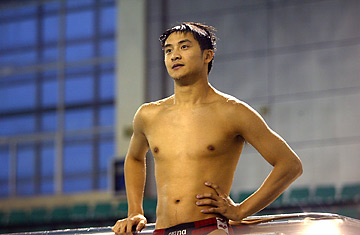
Former Olympic diving champion Tian Liang.
The gold medal that got away may have been galling for the Chinese. At the Watersports World Championships in Melbourne, which ended on April 1, China completely dominated the diving competition, with its male athletes taking nine out of 10 golds on offer and bagging several silvers and bronzes too. Their one failure came in the sport's blue-ribbon event: the 10-meter board competition. China's formidable sports machine knows that it only has itself to blame for that loss. But it was willing to lose a gold to enforce a rigid discipline on its prized athletes.
The country's best-known diver, Tian Liang, a two-time Olympic gold medalist on the 10-meter board and until last week the world champion, wasn't even in Australia. He has been at loggerheads with China's sports administrators ever since he returned in triumph from the Athens Olympic Games. Conspicuously absent from the roster of divers headed for Melbourne, he lost his place on the national team because of what control-obsessed sports bureaucrats called his excessive "commercial activities."
A month after the Athens Olympics, Hong Kong entertainment agency Emperor Entertainment Group offered Tian over $1.68 million to join the firm as an athlete-entertainer. Tian shot several television commercials, earning $140,000 in just two months' work, local media reports say. He and his then girlfriend, Guo Jingjing, also a world diving champion, became a celebrity couple, making regular appearances in gossip magazines and television. It was a revelation for the sheltered Tian, who had been so dependent on his sports handlers that he didn't know how to order food in a restaurant until he was 25. "I enjoyed all the activities. I never traveled before. Now I get to go to a lot of places," Tian told the Southern Weekend. "Nowadays more athletes receive invitations from companies. I believe this is how the sports industry needs to develop."
Tian had good reason to believe that China's sports industry would become more commercial. After all, three Chinese have played in the National Basketball Association. And a handful of top athletes and coaches in table tennis, badminton and track have appeared in prime time TV commercials.
But Tian was different. Other athletes who had disagreements with the administration all end up apologizing. Wang Zhizhi, the former NBA player, had to make a public apology last April before sports officials would allow him to play in the China Basketball Association. He had been frozen out for four years after disobeying orders to return to China to practice in 2002. Tian's ex-girlfriend, Guo Jingjing, made a public self-criticism in 2005 to avoid being kicked out of the national team for "attending too many social activities." But the "Prince of Divers" as he is called, would never concede that he was wrong. "Tian Liang never acknowledges his mistakes," top diving official Zhou Jihong told a local paper. "China's diving team would be destroyed if it included an undisciplined player like him."
The 28-year-old has spent the last couple of years attempting to win back his place on the national team and secure a spot for the Olympics. He publicly announced that he would cease his commercial activities and curtailed his public appearances. But without admitting that what he did was wrong, this penitence was just not enough. In Athens, Tian had told reporters it was his "dream to win another gold for the motherland on my doorstep." But it wasn't to be. On March 26, the same day that China lost the 10-meter event he had made his own, Tian bowed to the inevitable and announced his retirement from diving. The bureaucrats had evidently decided to make an example of Tian to other errant athletes — even if it means losing a precious gold medal.
Tian was "used as an example, that discipline is very important for the Chinese athlete," says Brook Larmer, author of Operation Yao Ming. His case sums up the growing conflict between China's monolithic sports machine and increasing numbers of young athletes who prefer freedom — and cash — over following orders. They watch athletes like Yao Ming and tennis star Hu Na playing overseas and earning eight-figure incomes. But China's sports administrators are a formidable adversary. Says Larmer, "Even though the pressure for young athletes to do other things is increasing, I don't see the system changing."
